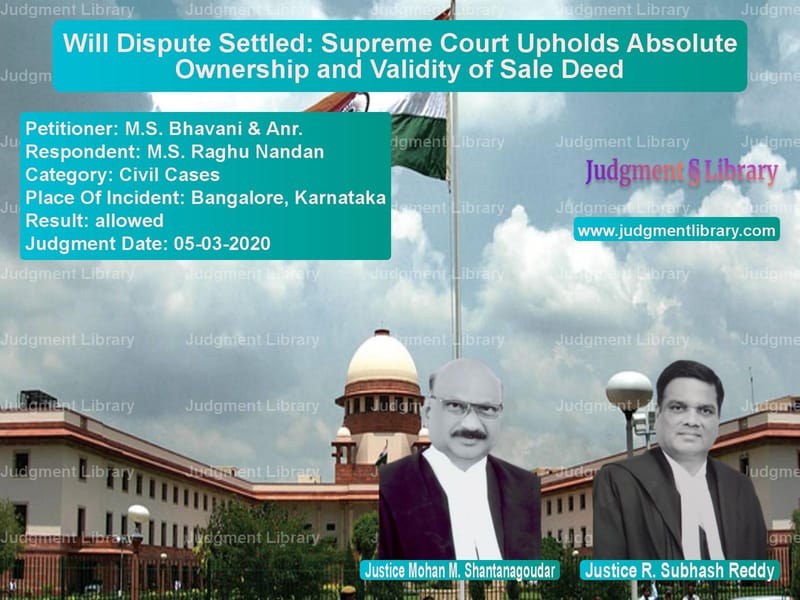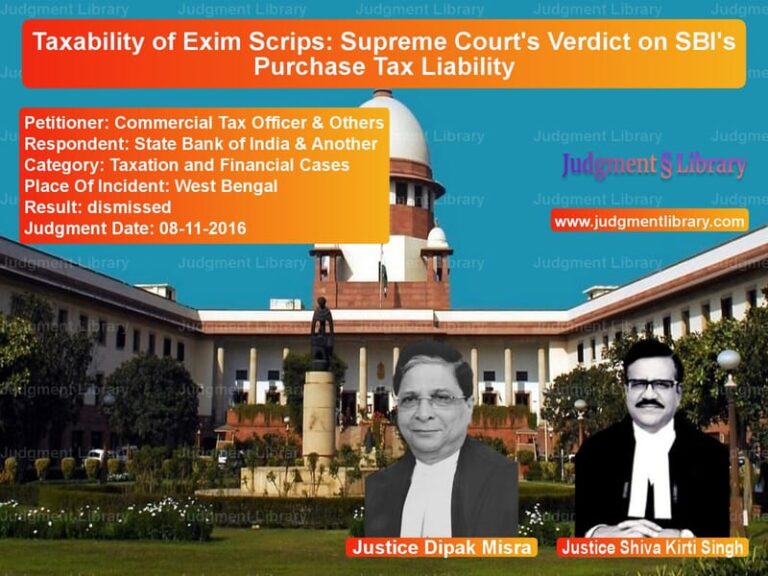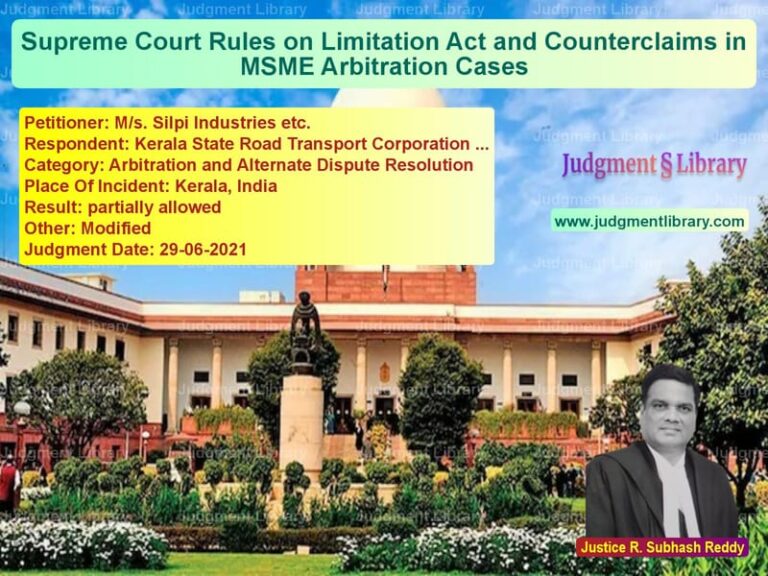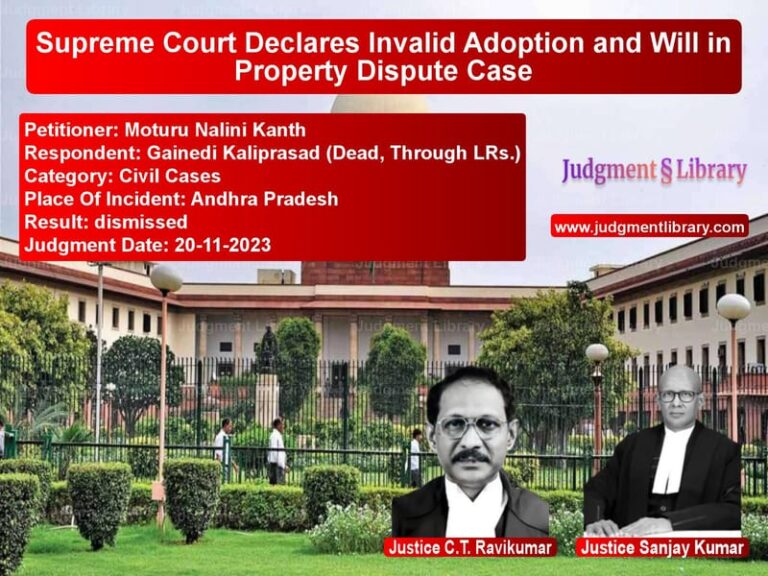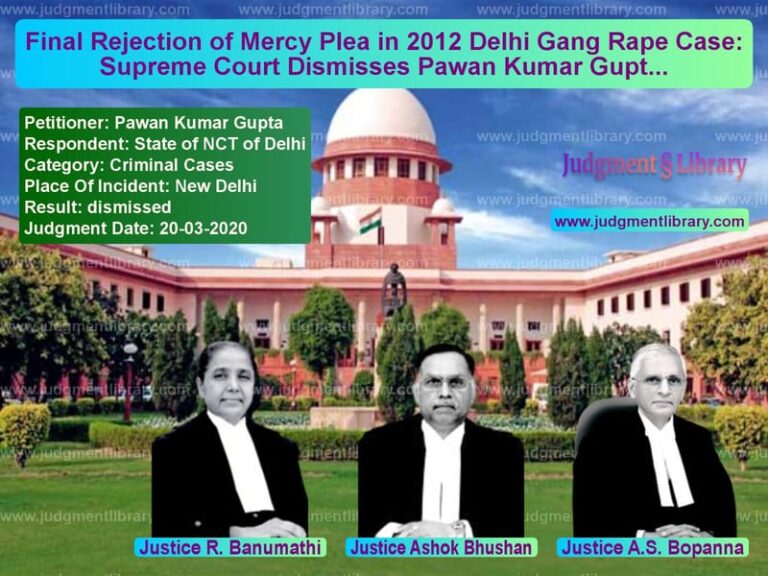Will Dispute Settled: Supreme Court Upholds Absolute Ownership and Validity of Sale Deed
The Supreme Court of India, on March 5, 2020, ruled in favor of M.S. Bhavani and her husband, setting aside the Karnataka High Court’s judgment that had partially invalidated a property sale based on an inheritance dispute. The Court affirmed that the testator’s widow, Nirmala Murthy, had absolute ownership of the property under a registered Will and was within her legal rights to sell it.
Background of the Case
The case revolved around the interpretation of a Will executed by M. Srinivasa Murthy, who had purchased the disputed property from the Bangalore Development Authority in 1974. The testator had two children: M.S. Bhavani (appellant) and M.S. Raghu Nandan (respondent). In his last Will, dated June 7, 1995, Srinivasa Murthy bequeathed the property to his wife, Nirmala Murthy.
After his death in 2002, Nirmala Murthy sold the property in 2004 to her daughter (appellant) and her son-in-law for ₹16,42,000. The respondent, M.S. Raghu Nandan, challenged the sale, arguing that the testator’s intent was for both children to share in the property’s value and that his mother had no right to sell it unilaterally.
Legal Proceedings
Trial Court’s Decision
- The trial court ruled that the sale deed was fraudulent, as Nirmala Murthy allegedly never intended to sell the property.
- It was claimed that she was misled into signing the sale deed, believing it was related to her visa application for travel to Australia.
- The court declared that the sale deed did not bind M.S. Raghu Nandan.
- The ejectment suit filed by the appellants was dismissed.
High Court’s Ruling
- The High Court ruled that Nirmala Murthy had absolute ownership but emphasized that any sale should have been conducted transparently, with her son’s knowledge.
- It held that, under the Will’s wording, the testator intended the property’s proceeds to be shared between both children.
- As a result, it upheld the trial court’s decision that the sale deed did not bind the respondent.
Appellants’ Arguments (M.S. Bhavani & Suresh Babu)
- The appellants contended that the Will unambiguously granted absolute ownership to Nirmala Murthy.
- They argued that there was no requirement to seek consent from the testator’s children before selling the property.
- They cited Supreme Court precedents to support their claim that an absolute ownership grant cannot be restricted by later conditions.
Respondent’s Arguments (M.S. Raghu Nandan)
- The respondent claimed that the Will created only a life interest for Nirmala Murthy.
- He contended that the testator’s intent was to have the property sold, with proceeds distributed equally between both children.
- He pointed to suspicious circumstances in which the sale deed was executed, arguing that his mother was misled into signing it.
Supreme Court’s Observations
1. Absolute Ownership of the Property
The Supreme Court analyzed the Will’s language and ruled:
“The testator clearly intended to grant his wife absolute rights, including the power to sell, mortgage, or lease the property. The decision of the widow is supreme in this matter.”
2. No Restriction on Sale
The Court found that the Will contained only a “desire” that proceeds be shared among the children, not a binding condition:
“The testator’s expression of desire for sale proceeds to be distributed does not restrict the absolute ownership granted to the widow.”
3. Sale Deed Was Valid
The Court rejected claims of fraud, emphasizing that:
“The High Court erred in holding that the sale was clandestine. The absolute ownership rights included the ability to sell without consultation.”
4. Trial Court and High Court’s Errors
The Supreme Court found that both lower courts incorrectly interpreted the Will:
- The trial court wrongly invalidated the sale by assuming fraud without substantial evidence.
- The High Court introduced unnecessary restrictions on absolute ownership.
Final Verdict
The Supreme Court set aside the High Court’s judgment and ruled:
“The sale deed executed by Nirmala Murthy in favor of the appellants is valid and binding on all parties.”
It ordered the possession of the property to be handed over to the appellants within three months.
Implications of the Judgment
- The ruling reinforces the principle that absolute ownership under a Will cannot be diluted by later conditions.
- It clarifies that a testator’s desire for proceeds distribution does not impose a legal obligation.
- The judgment prevents challenges to property sales executed under clear ownership rights.
- It upholds the sanctity of legally registered Wills and transactions.
Petitioner Name: M.S. Bhavani & Anr..Respondent Name: M.S. Raghu Nandan.Judgment By: Justice Mohan M. Shantanagoudar, Justice R. Subhash Reddy.Place Of Incident: Bangalore, Karnataka.Judgment Date: 05-03-2020.
Don’t miss out on the full details! Download the complete judgment in PDF format below and gain valuable insights instantly!
Download Judgment: M.S. Bhavani & Anr. vs M.S. Raghu Nandan Supreme Court of India Judgment Dated 05-03-2020.pdf
Direct Downlaod Judgment: Direct downlaod this Judgment
See all petitions in Succession and Wills
See all petitions in Property Disputes
See all petitions in Judgment by Mohan M. Shantanagoudar
See all petitions in Judgment by R. Subhash Reddy
See all petitions in allowed
See all petitions in supreme court of India judgments March 2020
See all petitions in 2020 judgments
See all posts in Civil Cases Category
See all allowed petitions in Civil Cases Category
See all Dismissed petitions in Civil Cases Category
See all partially allowed petitions in Civil Cases Category

